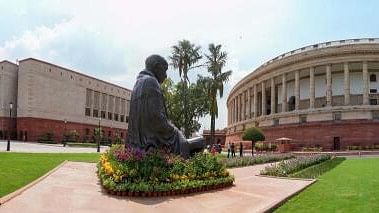
View of the new Parliament (L) and the old building (R)
Credit: PTI Photo
The constitution of the standing committees of parliament with better representation from opposition parties should augur well for more effective functioning of parliament. The delay in the constitution of the committees had caused concern. The opposition parties had criticised the delay, and the Trinamool Congress’ Rajya Sabha MP Derek O’Brien had written a letter to the Leader of the Rajya Sabha J P Nadda complaining about it. Parliamentary Affairs Minister Kiren Rijiju had denied any delay and said that discussions were being held with opposition parties on the matter.
There are 24 parliamentary standing committees which cover all the ministries and departments of the government. The composition and leadership of the committees are on the basis of the strength of parties in parliament. Since the opposition parties have more members in the present Lok Sabha than in the previous one, they wanted better representation in the committees and chairmanship of the committees of some important ministries.
The BJP controlled most of the committees in the last Lok Sabha because of its numerical advantage, and had, in most cases, used that control to defeat the very purpose of these committees – which is to scrutinise important bills and matters in a non-partisan way and make recommendations to the government in the nation’s and public interest.
Six committees were constituted last month and the Congress was given chairmanship of the important Public Accounts Committee (PAC) which examines government accounts and CAG (Comptroller and Auditor General) reports. The party has now been allotted chairmanship of three committees of the Lok Sabha, including the important External Affairs Committee, and one in the Rajya Sabha.
The Samajwadi Party (SP), the DMK and the Trinamool Congress (TMC) are also likely to get one chair each. Four other committees which have been constituted, including the Committee on Other Backward Classes (OBCs) and the Estimates Committee, will be headed by BJP MPs.
The committees are a vital part of parliament and make a crucial contribution to its legislative business. Parliament meets for about 70-75 days a year and many of those days are lost in fracas. So the Houses do not have the opportunity to scrutinise many bills. The committees, which function for the whole year, conduct such scrutiny.
Opposition members, officials and experts are able to provide critical inputs and suggestions which improve the bills. Both the NDA parties and the opposition parties should take their role seriously and ensure that the work in the committees is done efficiently and in a non-partisan manner. Many important legislations and matters relating to the country’s security, electoral system and federal relations may come up for scrutiny before the committees. It must be ensured that they get the most detailed and thorough investigation and the national interest prevails. An efficient committee system will deepen transparency and democracy.